Hire Remote Developers: Best Platforms and Hiring Guide

According to the latest data, more than 50% of digital engineers are working off-site, so it is a valuable consideration for companies to hire remote developers. We have studied a wide variety of online hiring platforms where you can find skilled coders and compiled a list of them to make the process of choosing simpler and result-oriented for you.
The selection of platforms to hire remote software developers outlines the main information, such as the benefits you may get and the “Why choose” section to help you decide whether it is a talent acquisition hub of your choice.
Moreover, we have prepared something extra to support you in selecting a platform to hire remote programmers. Our full guide with straightforward explanations highlighting necessary skills, cost estimations and crucial steps compares recruitment websites and answers your question of how to evaluate such marketplaces properly, so let’s get started.
List of sites to hire remote software developers
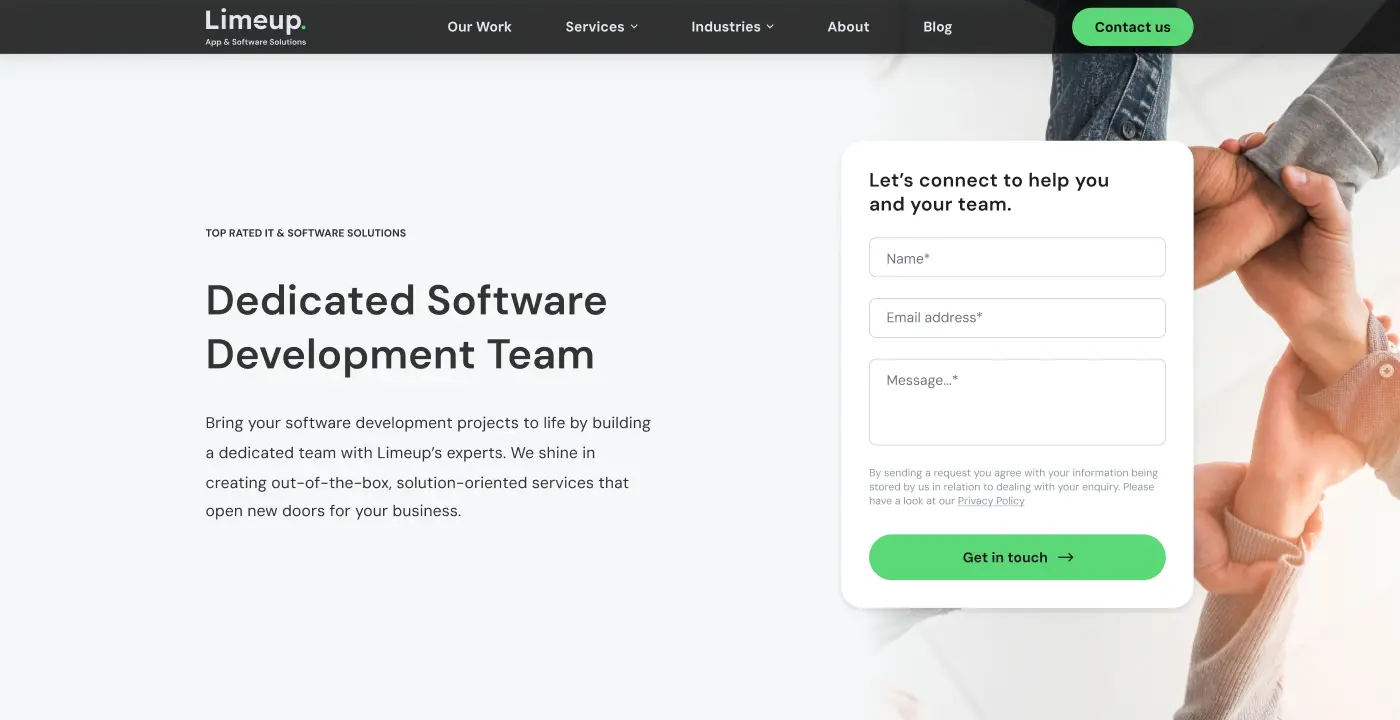
Founded: 2017
Headquarters: London, United Kingdom
Limeup is a place to hire a dedicated remote development team for any requirements you may have. We have been in the industry for almost 10 years, connecting our clients in 40+ countries with a diverse pool of programmers that helped them gain $36M+ total revenue growth.
We fulfill the objectives of our customers by focusing on clear communication and instant responses, besides providing the best outcomes by applying a modern stack for custom software, mobile and web development. Our experts never miss out on anything, since they constantly share with you regarding your project and are extremely focused on deadlines.
Cooperation models:
Key benefits:
- The highest quality will help you establish your position in the highly competitive markets like fintech, healthcare, logistics and many more.
- Our engineers use all the most current practices to keep your data safe, like NDA, IP protection and GDPR compliance.
- Limeup’s team will assist you every step of the way, including post-launch support and analytics.
Why choose us:
Average collaboration lasts for 5 years, signaling a high client retention rate that is proof of credibility. We promise successful remote cooperation with clear back-to-back management of all the processes provided for you, and a track record of your project and at what stage we are currently at, letting you know you are in capable hands.
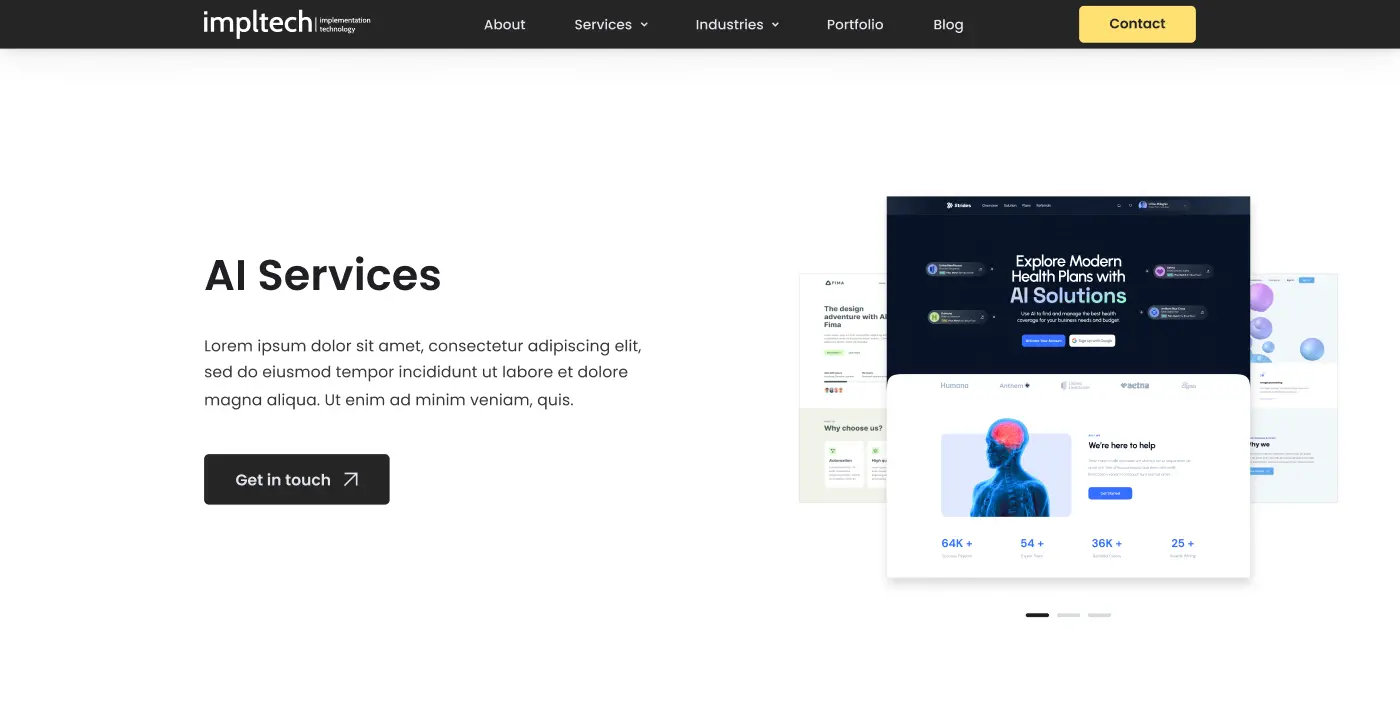
Founded: 2017
Headquarters: Berlin, Germany
If you want to hire a remote software developer, you can look at what impltech has to offer. Being a reliable representative of the IT market for many years, they’ve collected success stories helping their clients like Yugokraft, Wahler and many more. 93% of experts have advanced experience, so you don’t have to worry about the quality.
When employing engineers through impltech, you get specialists who not only write clean, scalable code but also understand business logic, which makes the cooperation smooth and effective.
Key benefits:
- They provide future-proof solutions, applying only the newest technologies like Java, Node.js, C++, etc, coupled with various cloud integrations.
- The approach of merging high tech with creativity results in successful campaigns.
- Big focus on data-driven decisions to 100% guarantee benefits.
Why choose them:
At impltech, you’ll get world-class remote developers who know how to deal with custom software solutions, keeping pace with evolving market trends and user demands. For example, Carl Weingand from MedFlux praised the high professionalism of impltech’s coders who were working on the company’s initiative and remained transparent along the way.

Founded: 2002
Headquarters: Sunnyvale, CA, United States
Using AI-powered suggestions and industry-specific talent analytics, LinkedIn provides big solutions and helps companies to hire a remote developer of any kind, utilizing LinkedIn Talent Insights and Recruiter to simplify the process.
Key benefits:
The “Open to Work” feature makes it possible for employers to clearly see that developers are open to new opportunities without having to publicly share the job search indication, giving companies the ability to directly approach the prospective candidate.
Why choose them:
The incorporation of LinkedIn’s substantial professional content portfolio improves recruitment notably because programmers can display their projects, open-source contributions and technical knowledge.
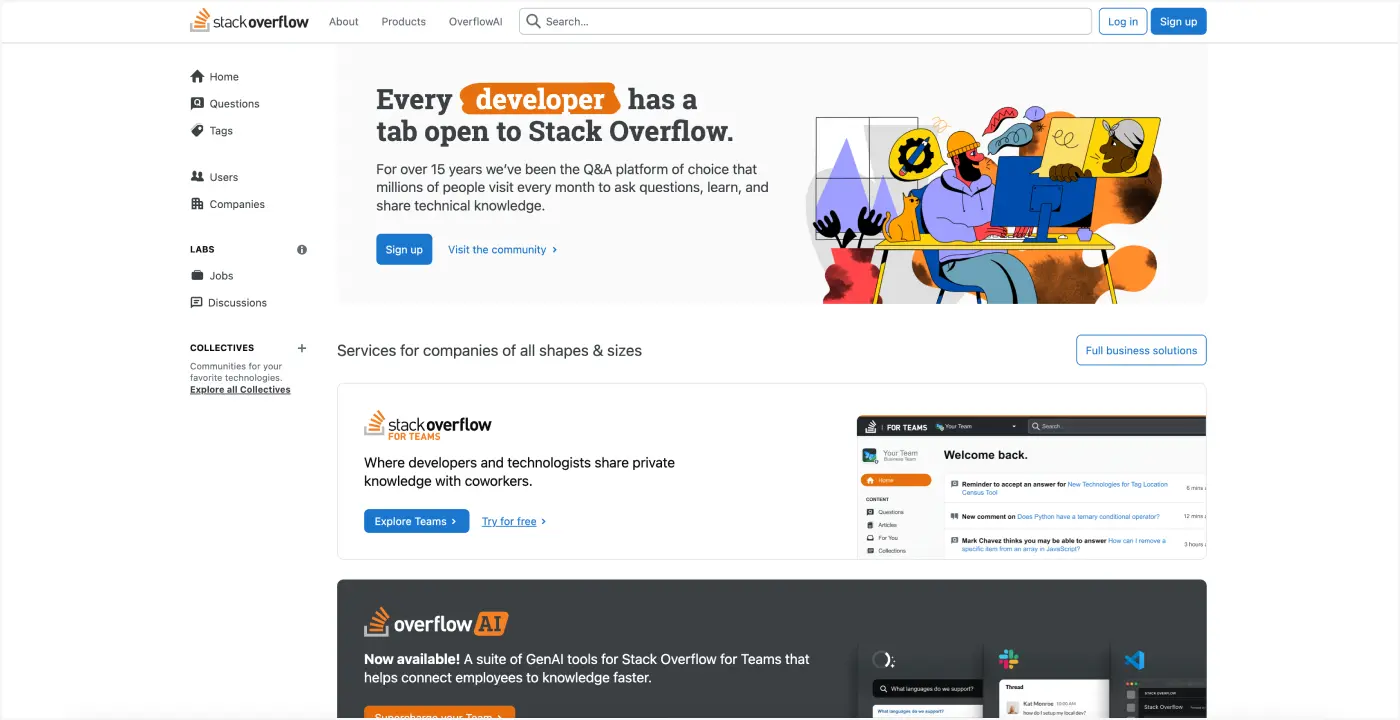
Founded:
Headquarters: New York, NY, United States
Stack Overflow is a known place to hire a dedicated remote developer since it helps to connect users to professionals, showcasing the global talent pool, technical conversation, reputation scores and expertise. Because of its blend of talent recognition and community moderation, this hub is a good place for problem-solving and networking with seasoned engineers.
Key benefits:
Their collaborative Q&A system is incredibly empowering for coders, especially with community moderation, where this type of control ensures excellent, peer-reviewed responses that are accurate and confidence-boosting.
Why choose them:
With a track record scheme as its focal point, the website draws the participants’ competency into the limelight, thus users have the opportunity to search for well-founded, enthusiastic contributors and even gather information on teamwork.

Founded: 2010
Headquarters: Wilmington, DE, United States
Toptal positions itself as a go-to platform to hire a remote team of developers by rigorously filtering and accepting only the top 3% of applicants, which means you get access to engineers who have already proven their technical grit and work discipline.
Key benefits:
The average matching time is only a couple of days and the trial period allows a “try before you buy” option, so companies often find themselves as if they have been given a shortcut to elite remote talent and making recruiting from a leap of faith into a calculated, high-confidence move.
Why choose them:
Toptal’s structured vetting procedure, global workers pool from over 100 countries and flexible engagement models enable companies to scale developers up or down depending on the project needs without long-term hiring commitments. It makes Toptal a good choice for those who are in a hurry but still prefer quality.

Founded: 2013
Headquarters: San Francisco, CA, United States
Upwork opens the door for you to find remote developers across more than 180 countries, where freelancers collectively earned over $1 billion, giving you access to seasoned engineers at appealing market rates.
Key benefits:
The number of software engineering providers open at all times exceeds 33,000, thus offering easy access to a highly skilled technical staff. This scale and variety mean you can quickly find workers whose skills fit your project needs.
Why choose them:
Upwork has integrated an escrow and time-tracking system, which helps ensure transparent work delivery and fair payments for both clients and coders. Additionally, this portal has a Talent Scout service, where vetted recruiters help match you with pre-screened workers, streamlining the hiring process without adding bias or fanfare.

Founded: 2007
Headquarters: London, United Kingdom
PeoplePerHour is a platform that helps businesses to hire remote development teams, claiming to support thousands of successful tech hires every month and providing clear prices that assist employers in not feeling as if they are making a “blind pick” when selecting candidates.
Key benefits:
This recruitment portal gives customers the power to try hiring for short-term instead of committing to long-term partnerships through its project bidding system and verified freelancer profiles. This makes it a compelling option for fast-moving digital teams.
Why choose them:
PeoplePerHour incorporates AI-driven talent matching, helping employers quickly zero in on qualified workers and streamline the hiring process without wasting time on dead-end profiles. This portal also offers detailed work histories and client feedback, allowing you to gauge reliability and technical depth at a glance.

Founded: 2010
Headquarters: Tel Aviv, Israel
Fiverr lets you tap into the worldwide pool of freelance coders so you can hire a remote developer team that you like the most. As for the singular engineers, the price range is so accommodating that often projects can be launched for just $5, thus allowing startups to take a small risk before making big long-term commitments.
Key benefits:
If you’re using the premium tier Fiverr Pro (vetted freelancers), there is a “satisfaction guarantee” which says that if you do not like the work done, you can get a full money refund for eligible orders.
Why choose them:
This platform is a suitable place for fast and flexible hiring, as it has over 3 million active buyers every year, and thousands of tech jobs are posted daily. Fiverr’s tiered talent system lets you quickly filter candidates by expertise and budget, making the search smooth and quick.
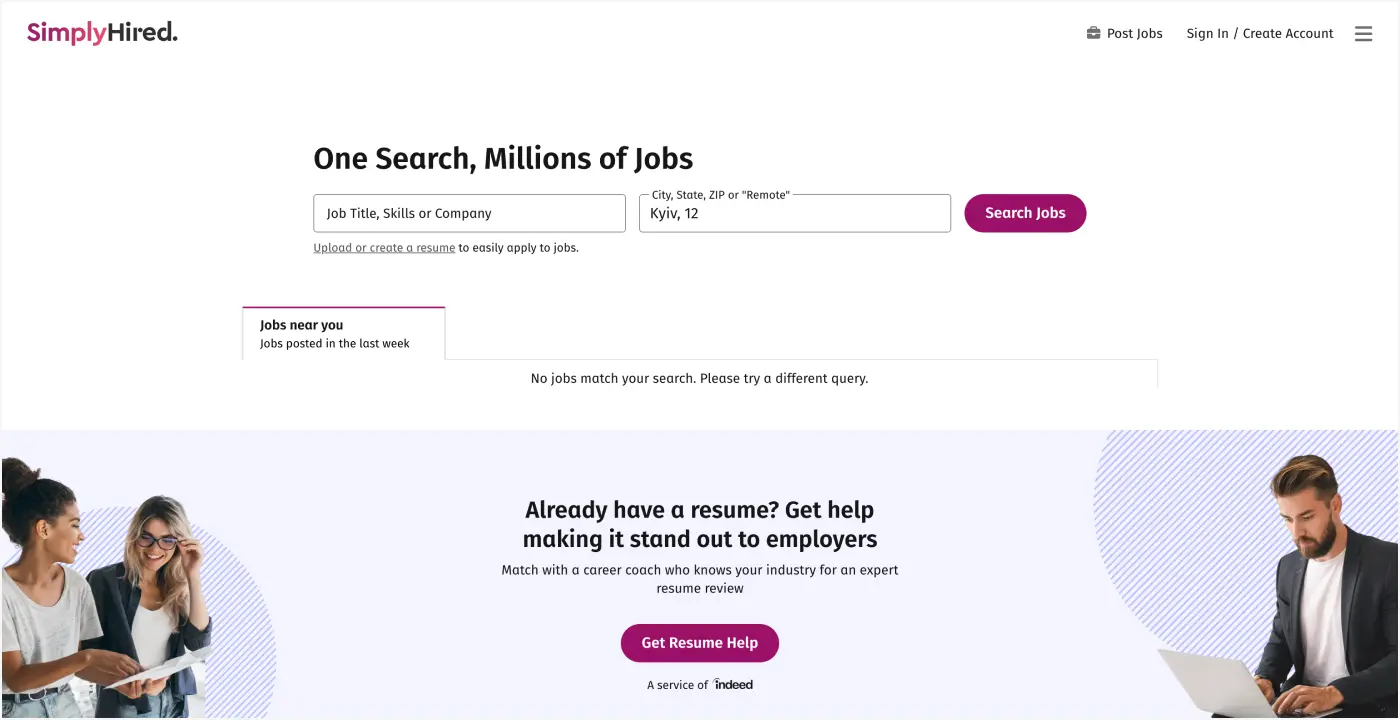
Founded: 2003
Headquarters: Sunnyvale, CA, United States
SimplyHired pulls together job postings from more than 100 boards, providing you with the possibility to hire a remote programmer in a competitive technology area. Companies can easily identify the right candidates who meet their salary and tech needs, thanks to millions of monthly vacancies and sophisticated salary filters.
Key benefits:
SimplyHired offers broad visibility, helping employers find suitable engineers faster without searching high and low across multiple platforms, making hiring feel like striking gold in a crowded market.
Why choose them:
Its emphasis on transparency and usage of built-in tools clarifies the expectations regarding compensation, which means that businesses are able to pull in the right people without guessing.
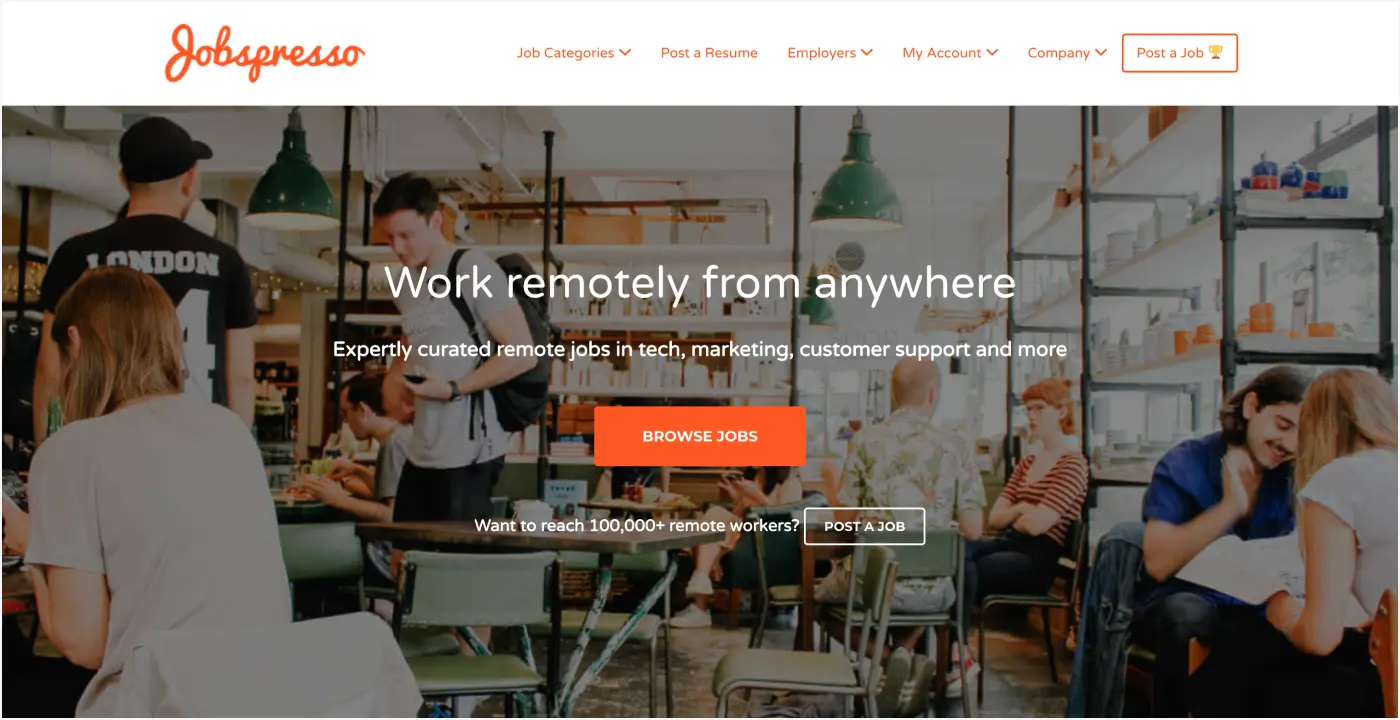
Founded: 2015
Headquarters: Toronto, Canada
Jobspresso showcases more than 1,000 handpicked job openings in tech, design and marketing, thereby drawing worldwide skilled engineers accessible and allowing you to hire dedicated remote staff easily.
Key benefits:
This platform presents a meticulously curated list of position postings, hence it guarantees that employers will get to the topmost, pre-tested tech professionals without going through inappropriate applications. Its 30-day money-back or re-post guarantee and international reach make it a trustworthy option for the recruitment of expert remote employees with certainty.
Why choose them:
The companies are able to work with skilled professionals easily because of the excellent vetting process that is very time-consuming but guarantees technical quality and reliable results. Besides, the project requirements and deadlines are still considered when the matching is done.
What is a remote developer?
It is a tech expert who creates and manages digital solutions while working outside the employee’s physical office — typically at home or any location with a steady internet connection.
Their technology stack will vary based on their domain expertise, for example, JavaScript, React and Node.js for front-end development, Swift or Kotlin for mobile apps, Python, Java, or C# for back-end services and AWS, Docker, or Kubernetes for cloud infrastructure.
Usually, collaboration and project management will be done via GitHub, Jira, Slack and Zoom, which will help to maintain effective communication and control over different versions of the software.
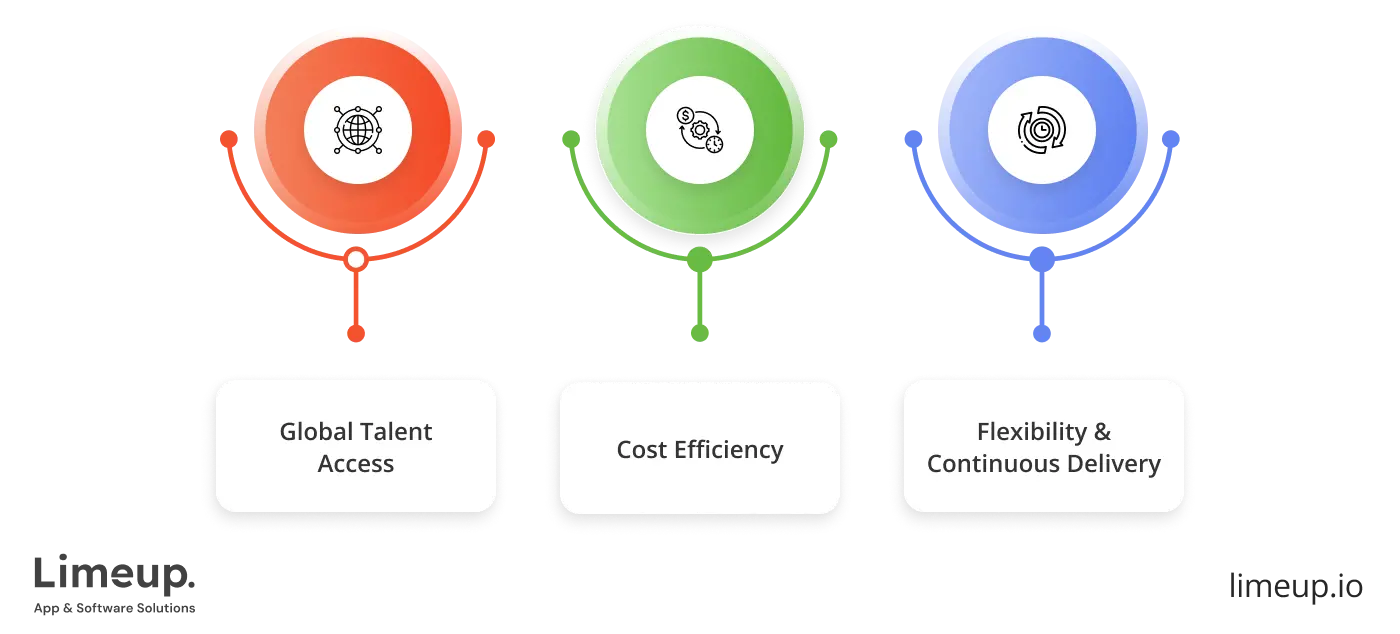
Employers gain numerous advantages if they hire dedicated experts remotely: access to a global talent pool, reduced operational costs, flexible scalability, and continuous development cycles that span multiple time zones.
To hire a remote developer successfully, it’s vital to understand the basics of virtual teamwork, evaluate both technical expertise and self-management skills and introduce good tools that will ensure the distributed teams’ cooperation and progress are visible.
How to select a platform to hire remote programmers?
According to the World Economic Forum, digitalization of every process is extremely fast-paced nowadays and the number of remote workers is growing increasingly, especially in the realm of software.
This number is expected to grow even more (+25% if to be precise) by 2030, so sooner or later you will need to deal with this task one hundred percent, which is why we are offering our help with it right now.
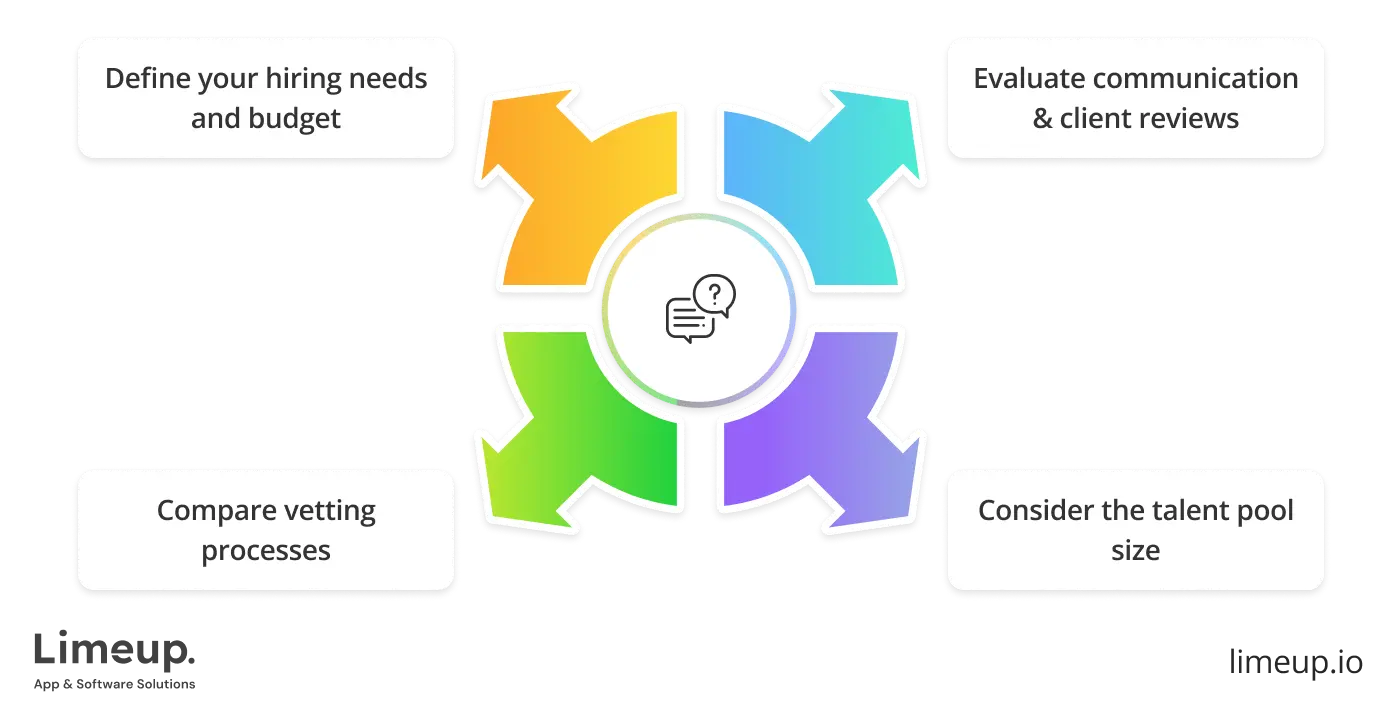
Let’s take a look at the following criteria below, starting with the definition of what you want, followed by other important points such as comparing, evaluation, etc, for you to be able to confidently use it in real-life situations while hiring remote developers.
Define your hiring needs and budget
Before selecting a platform, clarify what type of coders you plan to employ — freelancers for short-term work, dedicated teams for long-term collaboration, or full-time remote employees. This choice will determine if you should go to the freelance marketplaces, curated talent networks, or recruitment agencies.
Besides, set a clear budget as some platforms only work with premium professionals who have high hourly rates, while others stick to cost-effective options targeting startups or small businesses.
Compare vetting processes
Mostly, the credibility of a platform is determined by how it verifies its developers. For example, Limeup or Toptal perform very comprehensive technical and communication tests, thus guaranteeing the best talent. On the other hand, portals like Upwork or Fiverr depend more on free registration and user evaluation for the quality of candidates presented by them.
Assessing the vetting process of the platform helps you to decide between quality assurance and flexibility, depending on the extent to which you want the talent prequalified before you hire a remote developer.
Evaluate communication
It is extremely important to have a solid communication system when running projects remotely. Select a recruitment site that offers integrated messaging, milestone tracking, time reporting and project management tools or one that easily connects with your already existing systems, such as Slack or Jira.
By using platforms with communication tools integrated, it becomes simpler to hire dedicated remote developers, the chances of delays are reduced and the transparency of the work done between is increased.
Check client reviews
The opinions of customers give a picture of how good a portal is at resolving conflicts, providing support and making sure the engineers are accountable. Look into the reviews for the factors concerning reliability, ease of use, customer service speed and payment protection.
A platform that has feedback and ratings that are always very good and verified on portals like Google Maps or Trustpilot is more likely to provide an easier and trouble-free hiring and management situation.
Consider the talent pool size
The size and quality of the network are the main factors that determine the speed and accuracy of the technical recruitment process. Big websites provide access to an enormous list of workers with varied tech stacks and availability according to different time zones, while small platforms concentrate on certain areas with a more selective approach.
In the end, the key lies in finding an environment that supports efficiency, adaptability and continuous learning. By focusing on platforms that foster connection, transparency and growth, you set the stage for collaborations with a dedicated development team that evolves naturally and delivers meaningful results over time.
What are the steps to hire dedicated remote developers?
Once we’ve talked about the necessary tips then we can present you with a step-by-step plan that will enable you to pick a programmer who will make use of all the resources at hand, while everything is taken into consideration for having a speedy and enlightening process.
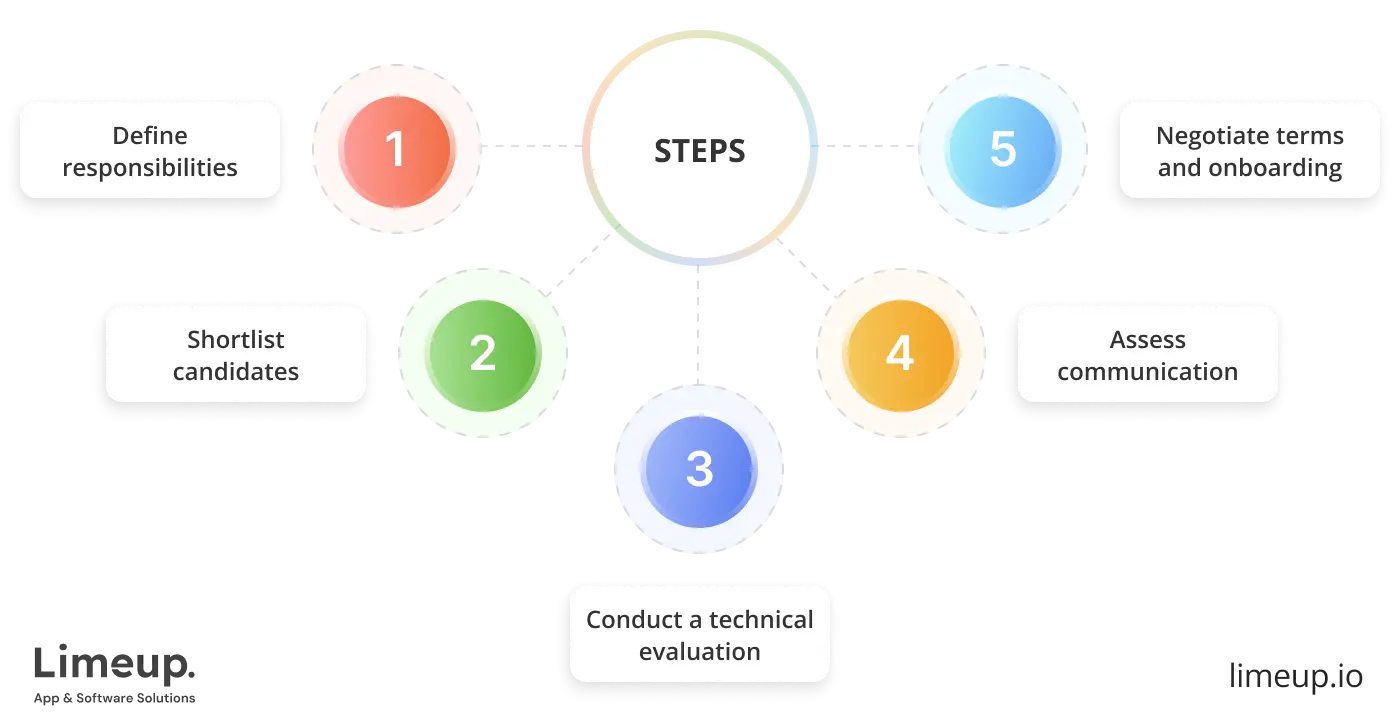
Define responsibilities
Start by defining a detailed list of tasks, expected output and performance criteria. Indicate the different technologies, frameworks and tools that the developer will be working with. This could be React Native for mobile apps, or Django for back-end development, or AWS for deployment.
A crystal-clear definition of roles makes it easier to stay in sync from the first day and also acts as a barrier to only letting through those applicants whose skills are directly aligned with your project objectives.
Shortlist candidates
After reviewing available profiles, focus on applicants whose portfolios, previous projects and technical expertise align with your requirements. Examine how their past work reflects problem-solving skills, adaptability and familiarity with the tools you need for your venture.
A concise list of candidates saves time during the evaluation, consequently maintaining an efficient but quality process, allowing you to work with the best remote developers for hire.
Conduct a technical evaluation
Practical assessments, live coding sessions, or technical interviews are the means through which the actual skill level of the candidate is determined. Make use of the platforms that provide a remote testing environment or ask the freelance remote developers to work on real-world tasks that are similar to your ongoing projects.
This step demonstrates the ability to write code, as well as logical thinking skills and the capability to operate under realistic constraints.
Assess communication
Beyond technical skill, ensure the developer can communicate progress, challenges and ideas clearly. Check how they cope with the time zone differences, how quickly they respond to feedback and how active they are in virtual meetings.
For example, a software development company from the UK, in this case, can be a good option if you are looking for a provider with EU time, so everything is up to you and your preferences.
Good communication practices are essential in ensuring that there is no lack of trust and that teamwork is good in places where the team is divided.
Negotiate terms and start onboarding
After having made your choice of candidate, the next step is to specify the engagement terms — scope, milestones, payment schedule and confidentiality agreements. Provide the developer with access to the necessary repositories, documentation and tools, and familiarize him with your workflow.
An onboarding process that is well structured will ensure that the collaboration is smooth and the new member is quickly integrated into your team.
Ultimately, bringing a remote coder on board is about building a partnership that grows over time. Success comes from fostering trust, encouraging initiative, and maintaining a workflow where both sides can adapt and thrive in a dynamic environment. This approach lays the groundwork for long-term productivity and innovation.
What skills to evaluate when you hire a remote software developer?
The creation of digital products and services in different locations has turned from being merely a trend to a necessity for companies looking for a quick and innovative way to enter the market. The success of such collaborations can be attributed to the virtual environment and the organization’s value, wherever the workers are integrated.
Knowing the factors that contribute the most to the efficiency and reliability of remote teams makes it easier for digital growth to be sustainable in the long run.
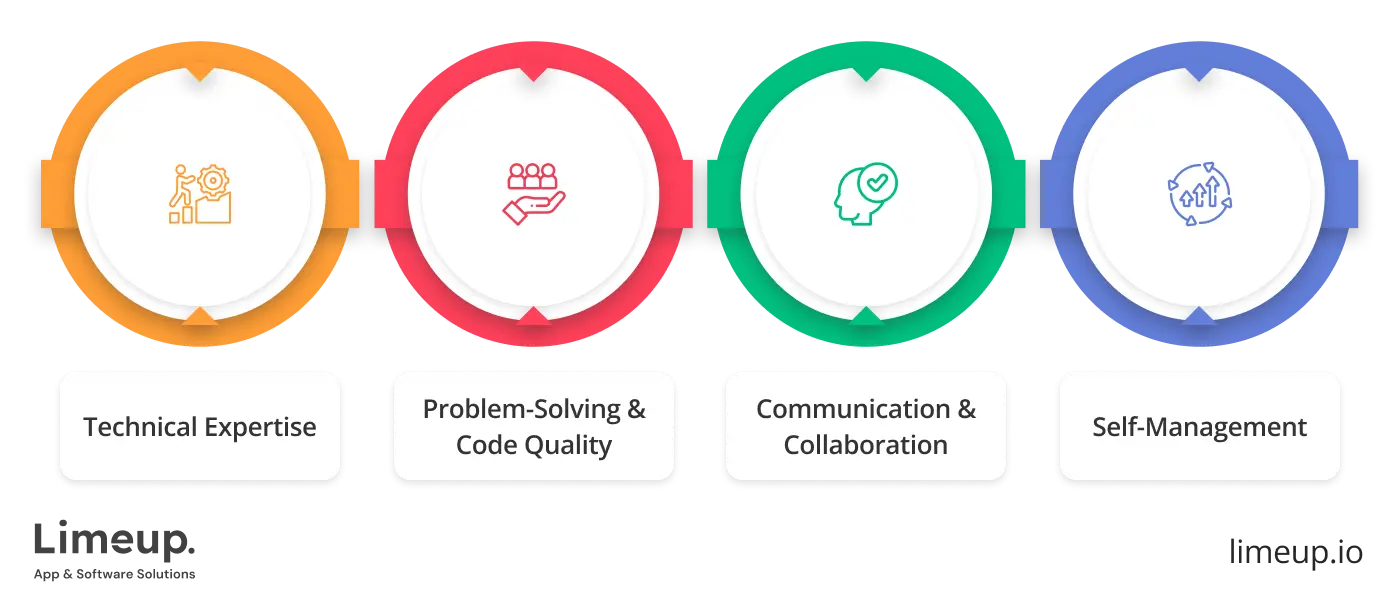
Technical competence
The hard skills of a freelance remote developer are known to be the primary support of any project, as they not only determine the speed of the tasks’ execution but also the strength and longevity of the software.
- Programming languages & frameworks:
Confirm that the developer has direct experience with the particular tools required for your project (e.g., React, Node.js, Python, Swift, Kotlin, or the stack used by mobile app development companies), which will significantly reduce the time for onboarding. We have mentioned this point already, but this is truly important so do not avoid or neglect it.
- Code quality & architecture:
Developers should be able to write clear and organized code for maintenance and scale easily while knowing software design principles, using version control and the deployment process.
- Problem-solving skills:
See how quickly and skillfully they find and fix issues, work on complicated problems and come up with solutions that work both in the short term and in the long run.
Communication
Clear and consistent communication in remote settings, along with very good coordination and collaboration among individuals, leads to a whole team effort, which results in fewer mistakes and projects that are less likely to be derailed.
- Clarity & transparency:
To hire a team of remote developers, engineers should reveal technical things in simple terms and tell the team about their progress, obstacles and the potential issues that might arise in order to establish and keep trust and coherence.
- Tool proficiency:
The capacity to work together easily with the help of different platforms like Slack, Jira, Trello and GitHub guarantees perfect task monitoring and workflow administration.
- Responsiveness & adaptability:
Fast answers, being flexible with the time zones, and being receptive to criticism all help to avoid delays and preserve the good flow of cooperation.
Self-management
Working remotely implies a discipline, not only a skill, while developers should supervise themselves in managing their time, setting their priorities and keeping their efficiency up.
- Time management & prioritization:
Strong organizational skills and the ability to prioritize tasks ensure deadlines are met without constant supervision.
- Autonomy:
Developers are expected to be self-starters, to work alone, and to make their own choices based on the right information, while they know which problems are worth escalating.
- Familiarity with remote workflows:
This involvement with such practices as agile methods, asynchronous communication and distributed team processes will secure smooth integration and, therefore, productivity.
When all three qualities come together, you gain not just a developer but a dependable partner who strengthens your team from afar. In the fast-paced world of distributed development, such individuals become the true backbone of innovation and consistent delivery.
How much does it cost to hire remote engineers?
In short: it depends. Visibly, it is not the type of answer business owners want to receive, so here is a longer yet brief explanation: it takes from $15 to over $200 per hour. This is a wide range, which is determined by a few go-betweens we will observe later in this material.
Some of the platforms we have mentioned above provide experts of different levels, while Toptal onboards only 3% of everyone trying to join the team, so the rates will differ. For example, Upwork says that the average price is between $15 and $50 if you want to hire a remote engineer.
| Experience Level | Hourly Rate Range (USD) | Notes |
| Junior | ~$15–$40 | Entry-level developers, limited experience, often need guidance. |
| Mid-level | ~$27–$35 | Competent programmers can handle projects independently. |
| Senior | ~$50–$150+ | Highly competent, know all the specifics; capable of complex architecture, mentoring and managing. |
Note: pay your attention to additional fees like 10–20% for service and up to 10% on membership, etc.
Factors affecting the cost
The key part of every project is its financial aspect, which practically shapes the resource distribution as well as the program framework, schedule and financial success.
Since it is directly involved in determining the code of finance and the relevant decision-making procedures, the paper will go to the next step by outlining the aspects to be considered to understand the meaning of the term and the major reasons that stand out affecting the price.

- Specialized fields
Working in such advanced and complicated areas as blockchain, AI/ML pipelines, DevOps automation, cloud architecture, or cybersecurity commands an additional $20–$80 per hour on top of the base fees.
The scarcity of such talents, along with their high technical skills, usually makes them the first ones to deal with the problems in the surrounding projects of high risk and great cost to find a remote developer.
- Tools & integration complexity
The hourly rate can be increased by $10–$50 for projects that involve different frameworks, APIs, or third-party systems. The complex integrations are tricky; thus, they need elaborate planning, continuous testing, and intensive team effort to guarantee that each part has perfect communication.
- Delivery speed & deadlines
Medium to high complexity ventures with expectations of quick delivery can raise hourly rates by $10–$60. Faster than usual accomplishment of tasks usually requires hiring more developers, working longer hours, or having very quick iterations, all of which contribute to the increase in overall cost of the project.
By anticipating challenges and planning accordingly, businesses can create a balanced approach that maximizes efficiency, maintains quality, and keeps financial risks under control while working with different engineers or even with web development companies and other similar providers.
Average rates by region
This parameter can be a part of the factors that influence the cost, and it truly is, but it is so complex that we decided to explain it in a separate section. You can gain a lot of valuable insights that will shape your vision and help you use your budget properly, thus providing you with positive outcomes and maximum worth from collaboration.
| Region | Pros | Cons | Hourly rates |
| North America | Excellent for product-driven roles and technical leadership. | Highest global rates and a slower hiring pipeline. | ~$40–$150+ |
| Western Europe | Strong engineering discipline and compliance awareness. | Higher labor costs and formal contracting processes. | ~$30–$120 |
| Central & Eastern Europe | Great quality-to-cost ratio and reliable long-term collaboration. | Senior availability can be competitive in major tech hubs. | ~$20–$100 |
| Latin America / Near-shore | Ideal for US-aligned collaboration and support. | Economic volatility can affect long-term pricing certainty. | ~$28–$70 |
| Asia / South Asia | Fast team scaling and a wide talent pool. | Communication and time-zone friction may slow iteration. | ~$15–$50 |
Ultimately, recognizing regional variations helps in shaping a hiring strategy that fits both budget and project goals. Leveraging these differences thoughtfully can lead to more adaptable teams, smoother workflows and collaborations that thrive across borders.
How to interview remote developers for hire?
Technical questions are complicated since you need to be a tech-savvy person to conduct them right, so how can we optimize this process? First of all, there are platforms like Limeup, impltech and Toptal which pre-screen all the contenders and choose the top-tier ones with reliable tech knowledge.
Secondly, our experts prepared tips for those who want to ask some questions about future cooperation, since they will not have in-person meetings. We have reviewed some of them in our material dedicated to hiring full stack developers.
Let’s dive deeper into the quizzes that will help you with the question of how to hire remote developers in terms of matching work approach, self-management, setup, etc.
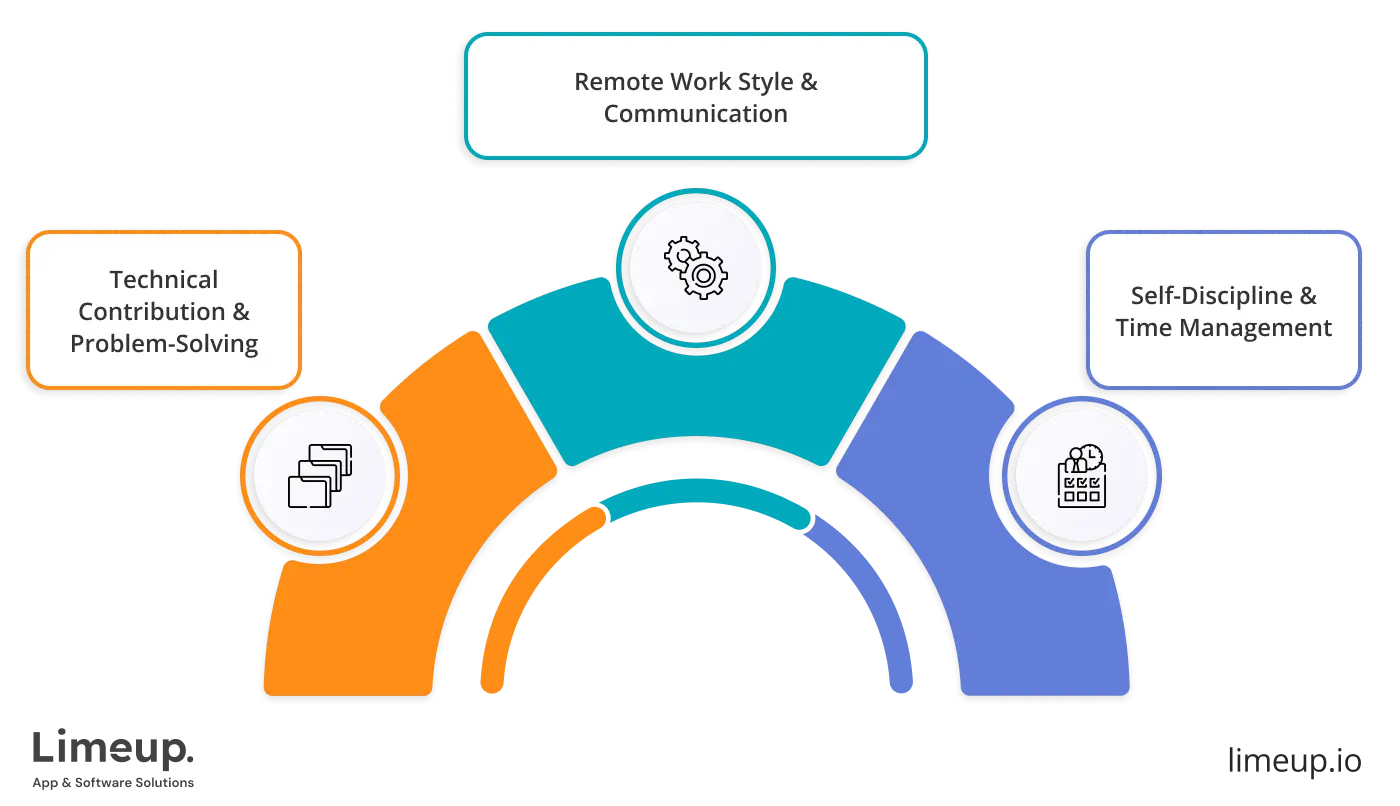
- What were your contributions across the latest case study?
It’s a top-tier question to be asked, even if the candidate has a wide background working with companies like yours as you will understand how the person understands projects behind the tech stack and related aspects. Moreover, you are able to check if the coder is hands-on with actual issues that can appear, toolsets, challenges and so on.
- What is your work style within the remote environment?
This standpoint reveals moments associated with transparency in communication (if the person is open to calls in case of any misunderstandings with co-workers), experience in using management tools, how they react to blockers and more.
- How do you handle projects with ever-evolving requirements?
By the “requirements” we mean a large number of nuances, from adding or changing functionality to burning the midnight oil if deadlines get changed (hopefully it will never happen, anyway, it’s essential).
- How do you ensure productivity and maintain focus when working from home?
The query here gets to the core of remote responsibility: will the developer be able to focus on their work without constant supervision? You will get to know their time management techniques and self-control in prioritizing without missing any task.
- What time zone overlap and communication schedule can you commit to?
Focusing on time synchronization, remote setups should hence not take the risk of miscommunication when clarifying their availability. The inquiry here basically reveals if the other side will go halfway (or even beyond) for meetings, reviews and unplanned immediate discussions without the need to always catch up.
A remote developer for hire who is onboarded will adapt to collaboration demands (of course, it has limits), they will be proactive, asking and answering questions, proposing ways to enhance the work process and maneuver through the storming digital ocean.
Ready to build your remote development team?
We are thrilled to share with you the most pertinent things we dealt with in this review. Our wish is that everything is as crystal clear as can be and that you have already selected the right path. Furthermore, not only did we answer all your questions, but we also have skilled developers who can catalyze your upcoming journey and are ready to help you with it right now.
We believe the process of being transparent with each other and trying to cope with everyone’s needs should be done thoughtfully and with empathy. We are always happy to hear from you so you can contact Limeup anytime for hiring top-tier specialists or collaboration purposes, and we will come up with a unique solution!
FAQ (Choosing & Comparing)
How do I know if a hiring platform is reliable?
The best companies for hiring remote developers show their genuineness by means of authenticated developer profiles, comprehensive client feedback and regular project success statistics.
Besides, it must provide secure payment systems, responsive support, and screening or vetting procedures that make certain of the quality and legitimacy of the candidates.
How to balance cost and expertise when building a remote team?
Finding a sweet spot where affordable regions align with high technical proficiency, ensuring you get value without compromising quality.
The center of this strategy is to employ junior and mid-level programmers from less expensive markets and, at the same time, to use highly skilled developers for complex tasks.
How long does it take to hire and onboard remote engineers?
Usually, the recruitment process lasts between 4 to 8 weeks and this duration is mainly influenced by the role’s complexity and the methods used to attract candidates.
During this time, the employer will conduct a series of activities such as screening candidates, performing technical assessments, negotiating the offer and implementing a systematic onboarding process to integrate new hires with the organization’s tools, workflows, and culture.
Should I hire freelancers or a dedicated remote development team?
Freelancers can be a great solution for short-term needs or specific tasks that need to be done quickly due to their flexibility and cost-efficiency.
On the other hand, for a long-term project that needs constant consistency, good teamwork and accountability, a dedicated remote development team is a better option as it guarantees stability, alignment and scalability to a greater extent.


